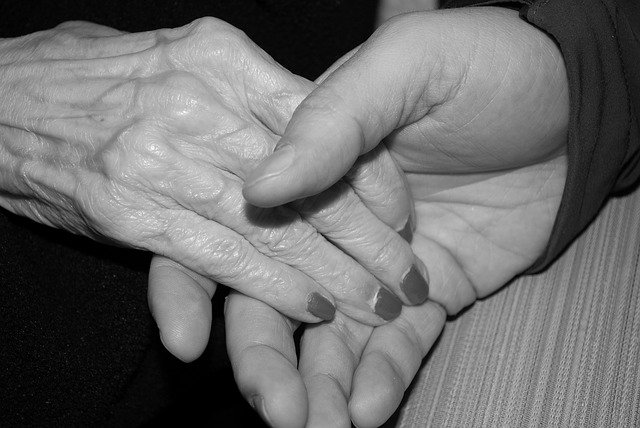“I think of my parents as toddlers. I give them directed choices, both of which are acceptable to me. I only share the next thing on the schedule since they can’t remember beyond that. I do my best to let their anger roll off me since their mood shifts so quickly and they don’t remember what was said.”
The 5th commandment tells us, “Honor your father and your mother, so that you may live long in the land that God is giving you.” This mitzvah, kibud av v’em, seems easy enough. After all, what child doesn’t love their parents? But wait, the commandment is not to LOVE your parents, but rather to HONOR them. Why?
It’s not as if the word “love” doesn’t appear in the Torah. We are told in the Shema/V’ahavta to “Love God, with all your heart, with all your soul, and with all your might” (Deuteronomy 6:5). We are told to “love your neighbor as yourself” (Leviticus 19:18). And yet, when it comes to our parents – those very people who gave us life – we are not commanded to love them, but rather to honor them.
While we hope that unconditional love between parents and children is the norm in families, we also know that not every parent treats their children well enough to engender love. An essential part of growing up is finding a separate identity from one’s parents, which can result in times of distance and disagreement.
So we are not commanded to love our parents; rather we are commanded to honor them. To honor them is clearly defined by our Sages in the Talmud. “What is considered honor? He gives his father food and drink, dresses and covers him, and brings him in and takes him out for all his household needs.” (Kiddushin 31b) In other words, to continue to provide for their basic needs, regardless of how one is feeling towards them.
What we are really told to do is to preserve the dignity of our parents. To ensure that they are cared for when they cannot do so for themselves.
What does it mean to honor and preserve dignity to a parent with dementia? Is it better to insist that they accept reality and confront their confusion, or to acknowledge their current perception of reality and “humor” them? Letting go of expectations and giving them the dignity of being treated as valued adults is a delicate balance when they are not fully functioning mentally. The Talmud makes it clear that we are to do everything possible to ensure that our parents are able to maintain their self-respect, regardless of their ability to comprehend their circumstances.
Berachot 8b of the Talmud reads, “And be careful to continue to respect an elder who has forgotten his Torah knowledge due to circumstances beyond his control. Even though he is no longer a Torah scholar, he must still be respected for the Torah that he once possessed. As we say: Both the tablets of the Covenant and the broken tablets are placed in the Ark of the Covenant in the Temple. Even though the first tablets were broken, their sanctity obligates one not to treat them with contempt. An elder who forgot the Torah knowledge he once possessed is likened to these broken tablets.”
We must continue to value and appreciate the people they were and the lives they led. Yet we also must accept the reality of their current condition. Perhaps the best way to honor our parents with dignity is to put aside that they are the parents. Treat them as they are, not as we wish them to be. Grant them the dignity to control as much as they can in their choices and decision-making, and honor and respect who they are today.






